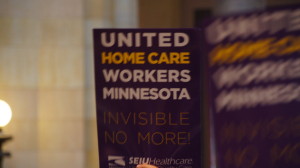MN union drive moves ahead in shadow of Supreme Court case

By Tom Steward | Watchdog Minnesota Bureau
ST. PAUL, Minn. — The future of public employee labor unions for state-paid personal care attendants remains up in the air as the U.S. Supreme Court weighs an Illinois case, but you’d never know it by the organizing drive under way to from a sister union in Minnesota.
The Service Employees International Union claims the campaign to unionize about 16,000 attendants who care for disabled and elderly individuals at home constitutes the biggest union election in Minnesota history.
A LOT ON THE LINE: An estimated 16,000 home care attendants could become dues-paying SEIU members.
“These organizers will knock on doors and talk to Home Care workers, supporting them in taking collective action and building their Union,” states an SEIU online job description offering $600 a week for temporary organizers. “When they win their election, Homecare Workers will have the power to pull themselves out of poverty, and to make real improvements not just in their own lives but in the lives of the thousands of seniors and people with disabilities they serve.”
The SEIU already knocked on Catherine Hunter’s door. The Burnsville mother who cares for her special needs son answered with a Minneapolis Star Tribune op-ed titled “Why do care attendants need a union?”
“How much more is a union going to be able to ‘win’ for a PCA like me? And how much would this ‘representation’ cost me? If a union forms in Minnesota for PCAs, and if they are able to win me another $2 an hour in wages, that gain most assuredly will get swallowed by union dues. As a former teacher, I am all too familiar with union dues,” wrote Hunter.
The SEIU’s job notification indicates training began in late February with the organizing phase expected to last into May. The posting also stressed the importance of speaking a second language such as Somali, Hmong or Spanish.
“They’re going after the very people who are already overworked,” said Kim Woehl, a union opponent who receives state funding to care for her 18-year-old son. “Already underpaid people who are already exhausted and they’re taking what little these people have and taking that away, too.”
Until now, SEIU’s organizing drive has remained low-key, unlike the controversial drive to unionize small business owners who operate home-based child care facilities with state-subsidized clients. That separate campaign by the American Federation of Federal, State, County and Municipal Employees union was halted by the courts, pending the outcome of the Illinois case in the next few months.
SEIU representatives didn’t respond to several inquiries, but Watchdog Minnesota Bureau obtained a copy of a canvassing SEIU letter sent to thousands of personal caregivers statewide. Written by a St. Louis Park couple who care for their special needs daughter, the letter addresses concerns about the union coming between caregivers — often family members — and their relatives.
“The law allowing us to form this union makes it clear that those needing care, and their representatives, have the right to select, supervise, direct and terminate caregivers, and manage individual budgets. It also spells out that this union can never go on strike — after all, how do you go on strike against people who need your care?” the letter says.
Watchdog Minnesota Bureau also obtained a copy of the union authorization form for PCAs to sign to support an election that would form a collective bargaining unit.
See SEIU union authorization form for current PCA campaign.
Janet Konezny, a PCA in Edina, signed the form in hopes a union might lead to better mental health care for her 51-year-old son, she said.
“The pay is another thing. I don’t know how people can live on it,” Konezny said. “Frankly, I’m doing it because of my son, but the pay isn’t that good. It pays for my gas and groceries and that’s about it.”
If at least 30 percent of participating PCAs sign the form, the state will hold a union election. A signature also empowers SEIU to collect union dues from the PCA’s check.
“I authorize my employer or their agent to deduct the correct amount of dues and transmit such dues to SEIU Healthcare MN,” states the card.
The SEIU materials make no mention of the one development that could make or break the union drive, regardless of how many signatures come in. The Harris v. Quinn case before the Supreme Court could dramatically redefine the ground rules for unionizing PCAs and other independent contractors who are not employees of the state. A decision may come through about the same time as SEIU’s Minnesota drive winds down.
Contact Tom Steward at tsteward@watchdog.org.







